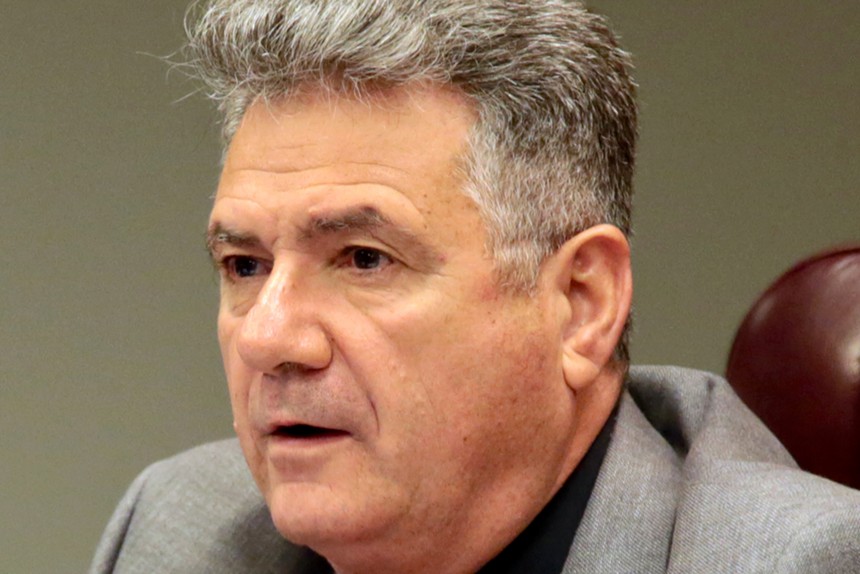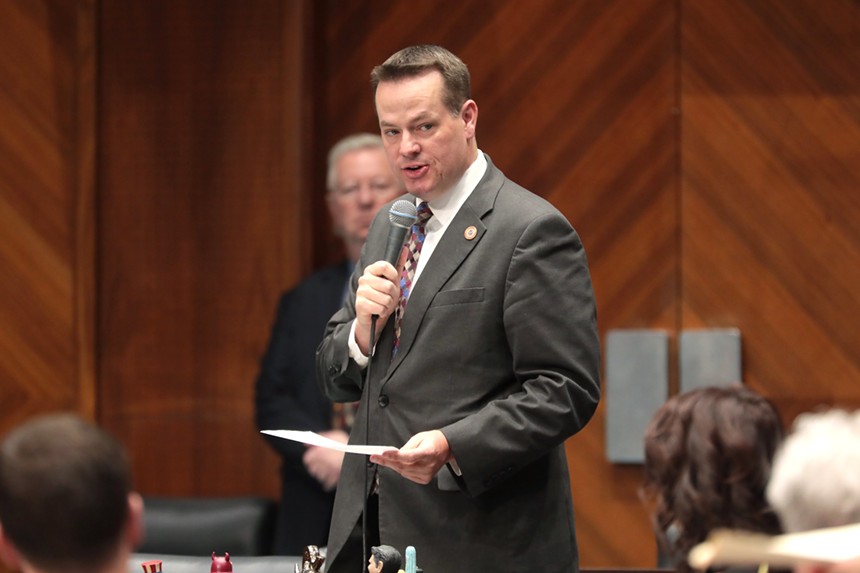“Some people don’t like marijuana. I’ve never used the stuff. I don’t care for it either,” the North Phoenix lawmaker said at a House Commerce Committee meeting on Feb. 13. Nonetheless, Wilmeth then introduced one of his “few bills” for the whole year — to allow Arizona’s weed cultivators to sell their products in other states should the federal government ever legalize marijuana.
“I’m a big believer in interstate commerce,” Wilmeth said at the meeting. “(The feds) could legalize it next week or in 10 years — we really don’t know — but the point of me running this bill this year, at this moment, is to be prepared so that when it does come, we can go off to the races and our marijuana industry can be successful.”
The committee approved the bill that day. But not long after, it hit a wall. The House Rules Committee, which has to sign off on every piece of legislation, never gave it a hearing. Wilmeth did not respond to a request for comment from Phoenix New Times about his bill’s demise.
But those who have closely watched Arizona’s rapidly corporatizing cannabis industry have a good idea of what happened. They suspect Wilmeth’s bill died because it was opposed by the Arizona Dispensaries Association, a trade organization of the state’s most powerful cannabis giants, including Curaleaf, Trulieve and The Mint Cannabis.
On its website, the ADA calls itself the “political and legal voice of the small to large businesses that are the foundation of the Arizona cannabis industry.” But marijuana industry experts and businesspeople who spoke with New Times — some on the condition of anonymity — said that high-minded language masks how the association wields its power.
The ADA may be “the voice” of the state’s cannabis industry but it also makes sure it's the only one, said Julie Gunnigle, the legal director of the Arizona chapter of the National Organization for the Reform of Marijuana Laws.
“There’s very much a culture of fear and silence,” Gunnigle said. There are so many brands who are terrified because if they speak out against the current market system, they are at risk of losing their contract for their license and they can’t produce.”
The ADA did not respond directly to a list of questions from New Times. But in an emailed statement, the organization said it "advocates for the interests of cannabis businesses of all sizes and promotes a safe, consumer-focused marijuana industry in Arizona. We establish best practices and maintain a consistent legislative and regulatory presence to represent the industry effectively. Our goal is to recruit and retain responsible members who are committed to consumer protection and providing high-quality cannabis in Arizona."
For such a powerful entity, the ADA also is a relatively new one. According to its LinkedIn page, the organization was formed in 2009, a year before Arizona legalized medical marijuana. But it wasn’t until Arizonans voted to legalize recreational weed that the ADA became such a force in state politics.
As a result, what was billed as an egalitarian landscape for legal weed — highlighted by the issuance of social equity licenses to dispensary owners in communities adversely affected by marijuana criminalization — has instead become increasingly corporate. The ADA is the voice for the biggest and richest dispensary companies, successfully steering public policy in its favor.
And the little guys often are drowned out.

Julie Gunnigle, the legal director of Arizona's chapter of the National Organization for the Reform of Marijuana Laws, said there's "a culture of fear and silence" around the Arizona Dispensaries Association.
Ash Ponders
‘They control all the dollars’
The state Department of Health Services controls weed licensing. But because big brands hold so many licenses, the ADA wields outsized power over how business is conducted in the state.When recreational weed was legalized in 2020, about 180 licenses were either sold or distributed by lottery, including the social equity licenses that were supposed to be reserved for people whose lives were damaged by old drug laws. Quickly, though, most of those licensees were bought out by the corporate marijuana behemoths.
By 2022, the top 10 dispensaries had consolidated control over half of the market, according to cannabis data tracker Headset.
On top of consolidation, and because of it, the dispensaries rule the weed landscape with an iron fist. Because the dispensaries control licenses, they make decisions on all business and can control who does what. If you want to become a cultivator, you need the approval of a dispensary. And to get approval, you have to shell out some serious cash.
“(Cultivators) pay a fee every single month to a dispensary just for the right to operate their business under a license,” said Jon Udell, an attorney who works alongside Gunnigle at NORML.
While fees recently have come down slightly, Udell said, the deals some cultivators struck years ago require monthly payments between $30,000 and $50,000. That means some cultivators must pay dispensaries more than $500,000 a year to simply do business.
That’s not the case in many other states with legal weed.
“If you want to be a cultivator or a manufacturer in Oregon or Colorado or California, you go out and get a cultivation or manufacturing license. Those don’t exist in Arizona,” Udell said. “We only have one type of license for medical and one for adult use.”
As a result, smaller brands must go along to get along. One brand owner told New Times how his product was suddenly taken off dispensary shelves when it became clear that it would have been too difficult for corporate-backed products to compete with it.
“They will try to squash or kick out anybody,” the brand owner said. “It’s never going to get better for the patients or the market. They don’t care because they control all the dollars.”

Republican state Sen. Sonny Borrelli has tried twice to pass laws regulating hemp outside of the Arizona Dispensaries Association's purview, to no avail.
Gage Skidmore / Creative Commons
Influence at the Capitol
Now that ADA is the nexus of power in the industry, it hasn’t been eager to surrender that position. Unsurprisingly, the ADA has become a force to be reckoned with at the Arizona State Capitol, battling to keep things the way they are or gain more power over adjacent markets.Like many industry powers looking to protect their interests, the ADA makes its presence felt at the Arizona Legislature by doling out money to party leaders and lawmakers.
In August 2022, the group’s political action committee, Arizona Dispensaries Association PAC, gave $75,000 to the Republican Legislative Victory Fund and $50,000 to the Arizona Democratic Party. In the weeks before the elections that year, it gave $40,000 to a PAC run by Chad Campbell, who currently is Gov. Katie Hobbs’ chief of staff. ADA’s PAC also donated another $60,000 to the state Democratic Party and $20,000 to the Republican Committee in Legislative District 5, a district that Democrats won handily days later.
In total, that’s about a quarter of a million dollars spent by the ADA before the 2022 election. Afterward, the ADA used its PAC to give $35,000 to PACs associated with Democrats and Hobbs. It also sent donations between $150 to $350 to 20 lawmakers.
While the donations have skewed toward Democrats, the association doesn’t appear to give on an ideological basis. Instead, it seems the organization uses its contributions to win influence with as many lawmakers as possible.
It would appear that influence peddling has worked. Lobbying against Wilmeth’s interstate commerce bill was the latest political punch thrown by the association since 2022. That year, the Arizona Republic reported on the group’s growing power and efforts to shoot down reforms such as instituting state-run contaminant testing and requiring dispensaries to report their own testing to the Department of Health Services.
The Republic reported that dispensaries can shop around with testing companies until they receive favorable results and don’t have to report tests that show contamination in products. A partner at The Mint, Raúl Molina, told the Republic he was worried the dispensaries would be making enemies by opposing a bill that contained a lot of good provisions.
In 2023, Republican state Sen. Sonny Borrelli introduced Senate Bill 1271, which would have prevented hemp-derived products like delta-8 from being regulated like marijuana. Industrial hemp, from which delta-8 products are derived, is currently regulated by the state Department of Agriculture. Borrelli's bill would have kept it that way and also would have legalized delta-8. It passed the Senate in a 29-1 vote.
But state Sen. T.J. Shope, also a Republican, countered with SB 1453, which would have required delta-8 products be produced and sold only by entities with a medical or recreational dispensary license. SB 1466 passed, though neither it nor Borrelli’s bill were ever considered by the state House. During a Feb. 9, 2023, committee hearing in which Borrelli’s bill was considered, ADA lobbyist Pele Fischer said the ADA was neutral on it but thanked Shope for running his bill.
A year later, Borrelli tried again to pass another bill, SB 1186, that would have legalized delta-8 products. But it failed again, passing the Senate but dying in the House. This March, Attorney General Kris Mayes released a legal opinion stating that delta-8 products cannot be legally sold outside of licensed dispensaries already regulated by the Department of Health Services, which Udell criticized at the time as "giving the marijuana industry something that the legislature would not."
Another bill caught the attention of marijuana experts this year. Republican state Rep. Steve Montenegro introduced House Bill 2451, which primarily was about preventing marijuana advertising from appealing to children. But nestled deep in the bill was a provision that would have given the ADA’s dispensaries total control over all advertising of marijuana paraphernalia, such as bongs, pipes and rolling papers, which dispensaries have nothing to do with.
“Only a marijuana establishment or nonprofit medical marijuana dispensary may advertise marijuana, products containing tetrahydrocannabinol or marijuana paraphernalia,” the law read.
Dr. Gary Kirkilas, a pediatrician, testified in favor of the bill at a House Health & Human Services Committee hearing on Feb. 4 of this year, noting that he “had the pleasure of working together with” Fischer and the ADA on the proposed law.
Gunnigle noted that the bill also presented serious concerns about the definitions of paraphernalia and advertising. Is packaging considered advertising? What about a website? If someone goes on a podcast and mentions they work at a glass-blowing outfit that produces pipes, would that be advertising?
“We’ve never seen anything like this in at least the marijuana market where you’re giving one industry control over another,” Gunnigle said in March. “What market incentive could a dispensary possibly have for approving paraphernalia advertising that’s not being sold in their shops?”
Ultimately, the bill passed the House but ran aground in the Senate.

Republican state Rep. Justin Wilmeth attempted to pass a law allowing Arizona weed products to be sold in other states, but it met with opposition from the Arizona Dispensaries Association and went nowhere.
Gage Skidmore/Flickr/CC BY-SA 2.0
‘Awful status quo’
It was a victory for the ADA that Wilmeth’s bill to allow interstate marijuana commerce died a quiet death. While plenty of media outlets reported on it passing through the committee, almost no one reported on why it advanced no further.But why wouldn’t Arizona’s biggest marijuana companies want to be able to export their products to other markets? According to Fischer, those companies were more worried about products coming into Arizona.
“While I understand the concerns of making sure we’re open to business to export,” Fischer said, “I think we need to think very carefully about the import."
Udell believes there’s probably more to it than that.
“I think they are terrified of anyone who’s not them getting a marijuana bill over the finish line,” Udell said. “If a substantial reform bill got done, what’s coming next? Brands are going to wake up and be like, ‘I’m done paying $300,000 (a year) to a dispensary just for the right to operate a 1,000-square-foot manufacturing facility. This is insane.’”
Udall wonders if small cannabis businesses will eventually organize for their own interests against the mega dispensaries. If they do, it could spell trouble for the giants keeping a tight grip on the state’s young legal weed industry.
“That’s the nightmare scenario for the ADA. Because they aren’t as powerful as they make it out to be,” Udell said. “In large part, it’s because they’re defending this awful status quo.”













